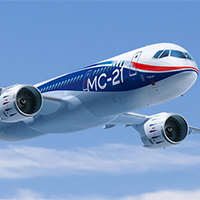Russia’s MC-21 rolls out in Irkutsk

United Aircraft Corporation subsidiary Irkut rolled out the first MC-21 narrowbody airliner Wednesday from its factory in Irkutsk in eastern Siberia. The milestone, which came roughly some six months later than last scheduled, nevertheless marked what the Russian company considers a sort of vindication for a program some in the West have disparaged as an overly ambitious attempt to compete with the likes of the Boeing 737 and Airbus A320.
In attendance at the ceremony, Russian prime minister Dmitry Medvedev spoke of the prestige the project has brought to the country, as well as its importance to helping move its economy forward. He also congratulated Irkut’s employees for their role in shaping the future of Russia’s return to prominence in commercial aircraft manufacturing.
The grand unveiling re-establishes a project timeline for the Irkut MC-21 that by last December appeared less than completely firm, given the failure to roll out an assembled airframe as promised by that time. Last August Irkut reported it had mated two fuselage sections of the first MC-21 prototype, and re-affirmed 2018 as the target for type certification. In early December, the governor or Russia’s Irkutsk region inspected the Irkutsk aviation plant (IAZ), where executives showed him a “complete fuselage with all sections having been joined.” Soon afterward arrived the prototype’s composite wing consoles, in time for the revised rollout target of this year’s second quarter.
However, during the rollout Medvedev referenced plans for first flight “within a year,” and UAC officials acknowledged that a previously quoted target for the end of 2016 might prove optimistic unless all goes exactly to plan.
Speaking to reporters after the ceremony, Irkut vice president of marketing Kirill Budaev referenced the potential to replace some of the Western suppliers with Russian companies, but he conceded the need for potential new domestic suppliers to develop to Western standards before the OEM would consider any such move. “We are trying to keep a balance,” he said. “For sure we have an interest in both [Western and Russian suppliers]. We need to satisfy international airlines and they need international suppliers for sure. And we need to satisfy the Russian aviation industry because we need to force them to develop. We expect that sooner or later, local Russian manufacturers will be at least at the same level as international ones.”
Read More https://www.ainonline.com